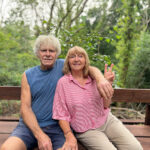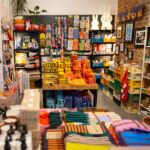Afri-Co-Lab: An Interview With Anna And Lilly
GET HASTINGS CATCHES UP WITH THE WOMEN BEHIND ST LEONARDS BASED AFRI-CO-LAB
Photography by Alice Denny
As my lemon and ginger tea cools on the table beside me and my interviewees get situated, I look around the space. I’d never been inside Afri-Co-Lab before, and it’s so much more than I’d imagined. Boxes upon boxes of art materials loom down from above, posters and notes are on all the walls, office and workshop supplies sit comfortably under tables or are tucked away in the next room. This is most definitely a place where creation happens.
I want to dive in and find out more. So I just ask… what is Afri-Co-Lab?
“It’s a creative community dreaming space. It’s an entity that supports anti-oppression and anti-racism,” Anna says. ‘It can look varied because it’s about experimentation and play. It’s about the community members trying things, teaching others, bringing people into what they do, sharing what they’re excited about.”

Anna looks to her sister and business partner, Lilly, who adds – “It’s also about making dreams a reality, empowering people to do those things and have those dreams. Showing the relevance of being creative in the everyday. It’s not less or more, it’s there, and we all have it. We’ve got to nurture and grow it, so we can nurture and grow ourselves. Bring your idea, and your time as well.”
“Everyone’s got creative energy,”Lilly continues. “It manifests itself in different ways. No one discipline is better than the other, we have affinities for different things and it’s about challenging the preconceptions and putting creativity at the forefront. We tend to highlight any moment of any project; we pinpoint and show the different learning styles, the possibilities for creativity.”
Afri-Co-Lab is a financially sustainable organisation. I’m told that fundraising has helped enormously and taken the pressure off finding rent, etc. Once they had funds secured, the money-making schemes fell away and creativity came to the forefront. Other people and organisations use the space occasionally, but that’s not the only thing bringing in revenue, the sisters assure me.
“We can make decisions based on our ethics and creative decisions”, says Anna. “We went into it with business minds, and ended up amplifying our superpowers,”Lilly adds. “We’ve got space and designated organised spots for creativity.”
I have to follow up on that… “What are your superpowers?”
Lilly tells me hers include being a cheerleader, being fluent in hype talk, understanding people and also having a more literal perspective on things. She’s detail-focused and zooms in; she’s brave and isn’t daunted by the prospect of going further and taking the necessary next steps.
Anna ponders when I ask her the same question. She says she’s good at inspiring people to do and try new things, and helping them nurture belief in themselves – essentially leading them on the journey to finding their own superpowers. “It’s hyping, but in a different way!”
The two creative sisters then go on to talk more about how different their minds are. While Lilly zooms in and is more concerned about the more intimate details, Anna is team-minded, sees the bigger picture, and has a Filofax mentality wherein she can absorb everything and retain it easily. Anna likes to work between 11pm and 3am. Lilly starts work at 6am. Anna takes on numerous projects, because she has so many ideas at once. Lilly prefers working on one thing at a time. Anna prefers to work quietly if she’s on a computer. Lilly prefers chaotic noisy spaces.
The pair also have different artistic backgrounds – Lilly’s being fine art and fashion, Anna acting and performance, plus filmmaking. Anna will always defer to Lilly anything about textiles or fashion visuals. Lilly will always go to Anna for words and messaging.
Those differences aside, they are both incredibly kind, and good in a crisis – they can remain calm, dig deep when they’re tired, and manage lots of people and partners when needed. They respect and cheerlead each other’s practices.
“I know you’re my sister, but I forget,’ says Lilly. “This is the project, you’re a person in the project. When we’re working together, we’re colleagues. During our recent performance project, we did a workshop with our teams to help loosen up… The co-director was leading an exercise and helping everyone open up. I looked at Anna and that’s when I first realised… I work with my sister. You’re my sister.”

Anna smiles when I ask for her favourite memory working with Lilly. “We’d just got this space [almost 4 years ago], it was December, dark and moody outside. We’d tidied and cleaned and Lilly was up the ladder. I was holding it while she free-painted the sign, which was only supposed to be temporary but it’s still there… It was a strange feeling, just us two, in that moment on a quiet seafront in this random space… who else would be with me in this moment? Only my sister would do that with me.”
They then tell me their lease ends in summer 2026. I ask what they’ll do when that time comes. Of course, Anna has already done research and eyed up some bigger spaces they could take on. Lilly shrieks when she hears the word ‘Azur’. More names are thrown around Debenhams? The old Peacocks? Lilly suggests The Alpha Cafe, but Anna declares it too small. “I want a wet, messy room, a holistic meditation room… all the spaces.”
“I want a bigger team, and to refine things so we can do them to the best of our ability,’ says Lilly.
“I want a beautiful luxurious space that holds everyone,” Anna adds. “People need a place to step out of their comfort zones and into their own vulnerability.”
*
Now reader, you may know Afri-Co-Lab from their project, ‘A Hero’s Journey’, a sold-out community theatre experience at the Hastings Museum and Art Gallery, part of the Home Live Art’s brilliant Knotty Festival of Performance 2024.
I ask the sisters and co-founders what the process was like, collaborating with local artists, practitioners and performers. They say it was really great, “because we couldn’t have done the things we’re planning now without going through that experience,” says Lilly. “It was a manifestation of all our dreams.”
“It was a village,” Anna adds. “It takes a village. I co-directed with Darragh O’Leary who has been with us since the beginning, and brought in a lot of collaborators. It was lovely to see people and get to know them on a long term project, week in and week out. It was great to collaborate with people and places across the whole town.”
They go on to tell me about an audience member who said “I really felt that it was ours”, because it referenced communities and cultures in Hastings.
“It’s so wonderful that we were able to show people something they could identify themselves in and felt like they owned, in a way. It was great to create something we felt we were in control of; something horizontal that went against the all-too-common shape of hierarchy in theatre. Community theatre is not lesser. Collaborating made something magical – and kick-ass.”
I ask if there were any difficulties or complications, and they tell me about their assistant stage manager getting Covid – and that generally, a company of 12 actors moving around and an audience of 60-70 people being led by them, aligning all the elements and props etc. was tough. They both agree that life can get in the way also, but it’s uncontrollable and you’ve gotta work out what you can do with what you’ve got.
*
We’ve already discussed potential future spaces, but I ask more broadly now – what does the future look like?
“The future is Afri-Co-Lab,” Lilly says, simply and boldly. “We’ve got funding from the National Lottery, Arts Council and Necessity, so all the dreams we’ve had can now be implemented and brought to life – and others’ dreams, too, as this also means more time for people to come in and use the resources.”
I ask what these dreams and future resources would be, and am given a lovely long list. Sewing, mending and upcycling. Mindful creative sessions. More trips to different places. More creative retreats. Writing and literary events. Generally being more OPEN, so people can visit properly. Pop-up shops!
“We’ve been doing pilots, without resources to sustain them. We created a new programme from what we learned from all that. Now we can pay artists and creatives to do these sessions, and folks can afford to come to them. Some places will be subsidised. We want to reinvent the word ‘community’,” says Lilly. “It sounds too budget. We never do things half-heartedly, we either make it beautiful and perfect or we don’t touch it.”
“Although we’ve headed up Afri-Co-Lab, many others have worked within it and cheered us along from the sidelines. Yes we’re the co-directors, but it feels like a village affair. Without the community, it wouldn’t exist. This town has a real big heart and people have a lot of time and want to see more things grow and thrive. Rather than working against the tide, we’re flowing with it. The ‘yes and?’ of this town has been the environment in which we’ve thrived and is a huge part of this. We wouldn’t have gotten there as fully and joyfully if we’d been in another place.”
“We appreciate all our helpers and volunteers, and everyone who has invested in the space and our community. It’s a space that belongs to many people, and we respect that gift by inviting everyone in, and thanking them.”
*
Afri-Co-Lab have an open house every Wednesday, 11am – 5pm. Check their website afri-co-lab.org for upcoming events and classes.



